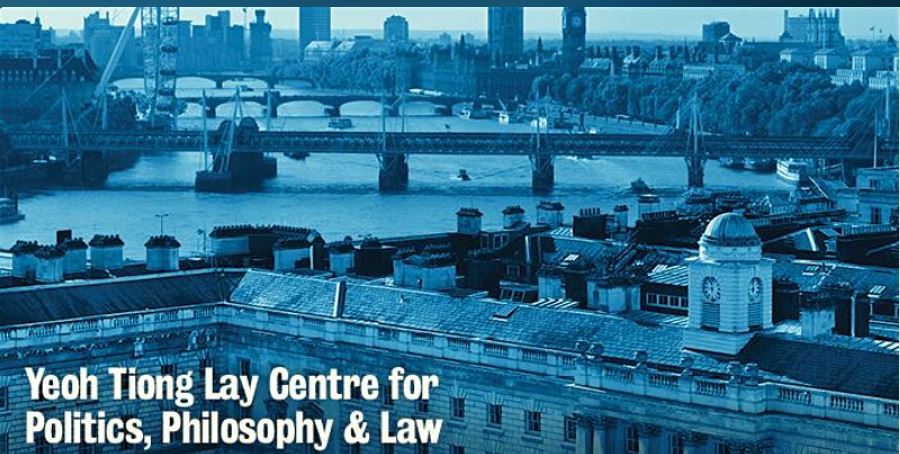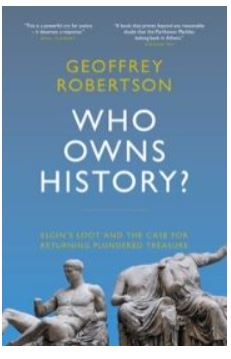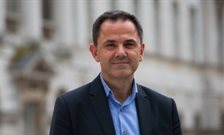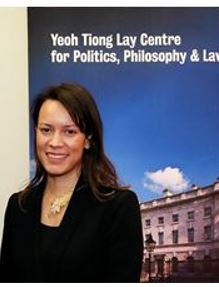Thursday, 6 February 2020 from 18:00 to 20:00
SW1.18, Somerset House East Wing
The Dickson Poon School of Law, King's College London
Strand
London WC2R 2LS
United Kingdom
WHO OWNS HISTORY? A panel Discussion at The Dickson Poon School of Law, King's College London

Description
The panel will feature a discussion of Geoffrey Robertson's recently published book, "Who Owns History? Elgin's Loot and the Case for Returning Plundered Treasure" (Biteback Publishing, 2019).

The biggest question in the world of art and culture concerns the return of property taken without consent. Throughout history, conquerors or colonial masters have taken artefacts from subjugated peoples, who now want them returned from museums and private collections in Europe and the USA.
The controversy rages on over the 'Elgin Marbles', and has been given immediacy by figures such as France's President Macron, who says he will order French museums to return hundreds of artworks acquired by force or fraud in Africa, and by British opposition leader Jeremy Corbyn, who has pledged that a Labour government would return the 'Elgin Marbles' to Greece. Elsewhere, there is a debate in Belgium about whether the Africa Museum, newly opened with 120,000 items acquired mainly by armed forces in the Congo, should close.
Although there is an international convention dated 1970 that deals with the restoration of artefacts stolen since that time, there is no agreement on the rules of law or ethics which should govern the fate of objects forcefully or lawlessly acquired in previous centuries.
Who Owns History? delves into the crucial debate over the ;Elgin Marbles', but also offers a system for the return of cultural property based on human rights law principles that are being developed by the courts. It is not a legal text, but rather an examination of how the past can be experienced by everyone, as well as by the people of the country of origin.
Speaker:
Mr Geoffrey Robertson QC
Mr Robertson is founder and joint head of Doughty Street Chambers. He has had a distinguished career as a trial and appellate counsel, an international judge, and author of leading textbooks. He has argued many landmark cases in media, constitutional and criminal law, in the European Court of Justice; the European Court of Human Rights; the Supreme Court (House of Lords and Privy Council); the UN War Crimes courts; the World Bank’s International Centre for Settlement of Investment Disputes (ICSID) and in the highest courts of many commonwealth countries.
Geoffrey has, as a jury advocate, appeared in many criminal trials at the Old Bailey and libel trials in the High Court. He has appeared in several hundred reported cases in the Court of Appeal (both civil and criminal divisions) and in judicial reviews in the High Court, and in subsequent appeals. He has a large advisory practice, for clients including governments, media corporations, NGO’s and local councils.
Commentators:
Professor Edith Hall, Department of Classics, King's College London

Since being awarded the Hellenic Foundation Prize for her Oxford doctorate (1988), Edith has held posts at Cambridge, Oxford, Durham and London Universities. She has published twenty books. She is Co-Founder and Consultant Director of the Archive of Performances of Greek & Roman Drama at Oxford and Chairman of the Gilbert Murray Trust. She has won funding for research from the AHRB, the AHRC, the Leverhulme Trust, the British Academy, the Center for Hellenic Studies in Washington, and has just been awarded a Humboldt Research Prize. She appears regularly on BBC Radio, and has acted as consultant to professional productions of ancient drama at the Royal Shakespeare Company, the National Theatre, Northern Broadsides, Theaterkombinat and other professional companies.
Professor John Tasioulas, Director of the Yeoh Tiong Lay Centre for Politics, Philosophy and Law, King's College London

Professor John Tasioulas joined The Dickson Poon School of Law in September, 2014 as the inaugural Chair of Politics, Philosophy & Law and Director of the Yeoh Tiong Lay Centre for Politics, Philosophy & Law. He was previously Reader in Moral and Legal Philosophy at the University of Oxford, where he taught from 1998-2010, and Quain Professor of Jurisprudence at University College London from 2011-2014. Professor Tasioulas is an Honorary Professorial Fellow at Melbourne Law School, a Distinguished Research Fellow of the Oxford Uehiro Centre for Practical Ethics, an Emeritus Fellow of Corpus Christi College, Oxford and a member of the Academia Europaea. He has held visiting appointments at the Australian National University, the University of Chicago, Harvard University, and the University of Melbourne, and has acted as a consultant on human rights to the World Bank. He has written extensively on topics such as human rights, crime and punishment, the rule of law, the ethics of Artificial Intelligence, and the theory of international law, including the nature of customary international law, jus cogens norms, and minimum core obligations.
To read Professor John Tasioulas' response during the discussion please see here.
Chair:
Professor Philippa Webb, Dickson Poon School of Law, King's College London

Philippa Webb is Professor of Public International Law. She joined The Dickson Poon School of Law in 2012 after a decade in international legal practice. She was previously visiting Assistant Professor in the Advanced LLM Programme at Leiden University (2009-2011). She has been Visiting Professor at Université Paris X Nanterre, ESADE Law School and Pepperdine University’s London programme. Professor Webb holds a doctorate (JSD) and an LLM from Yale Law School. She obtained the University Medal in her LLB and the University Medal and First Class Honours in her BA (Asian Studies), both of which were awarded by the University of New South Wales in Australia. Professor Webb has extensive experience in international courts and tribunals. She served as the Special Assistant and Legal Officer to Judge Rosalyn Higgins during her Presidency of the International Court of Justice (2006-2009) and, prior to that, as the Judicial Clerk to Judges Higgins and Owada (2004-2005). She was the Associate Legal Adviser to Prosecutor Luis Moreno-Ocampo at the International Criminal Court (2005-2006).